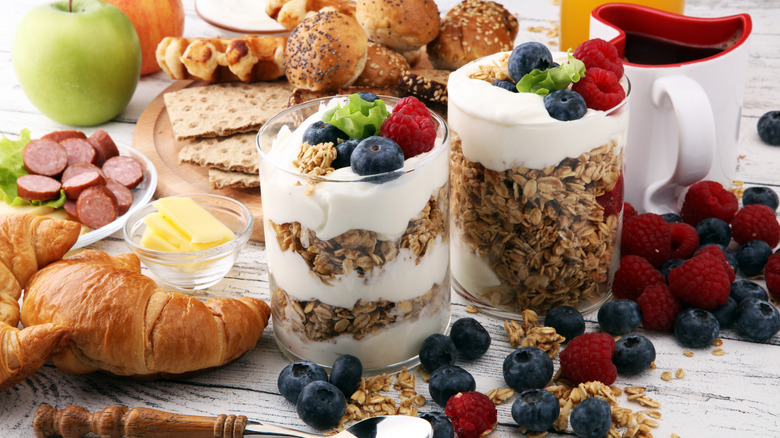Here's What You'll Find In A Typical Breakfast In Germany
When considering what people eat for breakfast around the world, it's important to note how Germans take this meal very seriously. Unlike Americans, who tend to consume quick breakfasts at home, hit the drive-through, or skip breakfast, Germans prefer leisurely morning meals with a variety of foods to choose from. While it's true that 33% of Germans report eating while commuting and 51% say that they eat breakfast at work or school, according to market intelligence agency Mintel, their breakfasts still tend to be a bit heartier than those their French and Italian counterparts consume. On weekends, Germans tend to set out more breakfast options too, since they have more time to relax.
You'll find baked goods on almost every German breakfast table. Traditionally, bread and rolls are offered, and these baked goods will be very fresh, often purchased that morning. People with celiac disease don't need to give up eating German bread or rolls either, as it's easier these days to find gluten-free baked goods in Germany.
To accompany your bread, croissant, soft pretzel, or brötchen (roll), you'll probably find butter, jam, honey, cheese, and sliced cold meat at your German breakfast table. Nutella is a favorite spread; the chocolate-hazelnut flavor goes perfectly with brötchen. Other offerings might include sausage, boiled eggs, fish (particularly in northern Germany), yogurt, fruit, sliced cucumbers, cereals, oatmeal, muesli, or quark, a cultured soft curd cheese with a yogurt-like consistency. Many Germans enjoy coffee, tea, milk, or juice with their breakfast.
In Germany, breakfast is an important meal
While you'll certainly find Germans who skip breakfast, the country's people generally agree that eating breakfast is good for you. Starting the day with a healthy, substantial meal gives you energy so you can tackle the day's tasks and provides the nutrients your body needs. Eating breakfast with family, friends, or colleagues gives you an opportunity to interact with others, making for an extra benefit to your meal.
In a study published in the March 2020 issue of the Journal of Clinical Endocrinology and Metabolism, German researchers found that eating a bigger breakfast and a smaller dinner helped participants burn calories more quickly. Participants who ate a small breakfast and a larger dinner had sugar cravings and were hungrier during the day. The researchers concluded that our circadian rhythms (body clock) help the body metabolize food more efficiently in the morning than in the evening.
The results corroborate earlier study results, such as the findings of a study published in the September 2015 issue of the journal Obesity. This study, conducted at Brigham and Women's Hospital in Boston, Massachusetts, showed that circadian rhythms affect metabolism. In other words, the timing of your meals affects how quickly your body turns food into energy.
These studies indicate that a typical German breakfast is healthier for most people than a small or nonexistent breakfast, especially if the evening meal is light, as it generally is in Germany. Such big meals can start your day in a healthy, delicious way.

